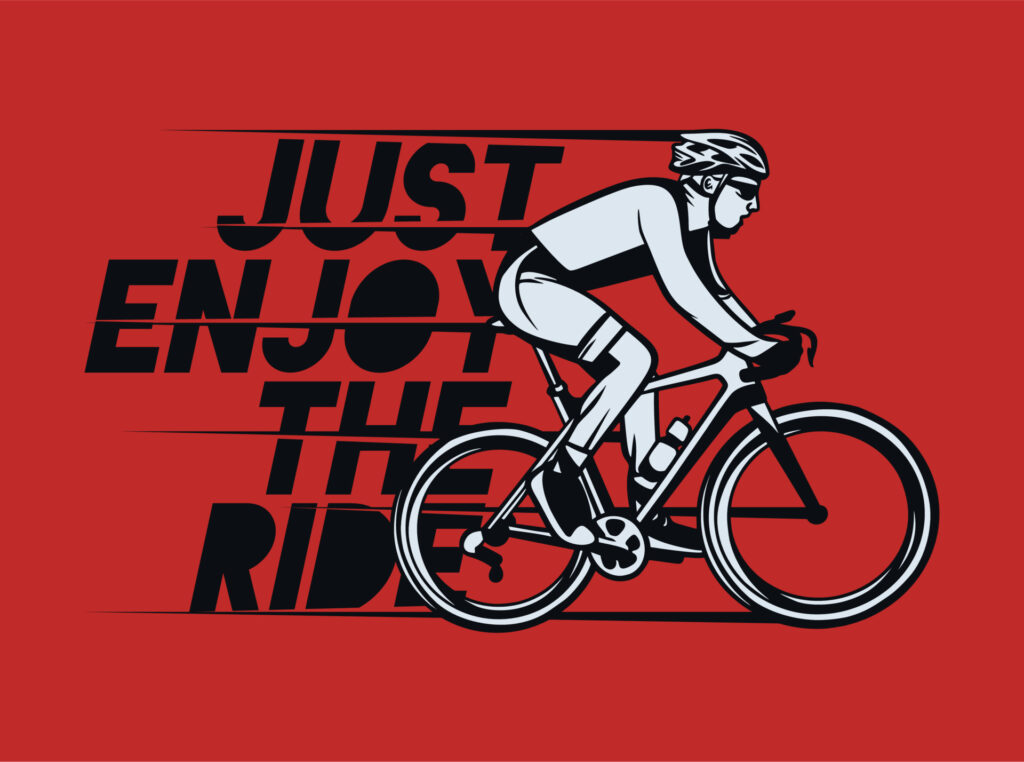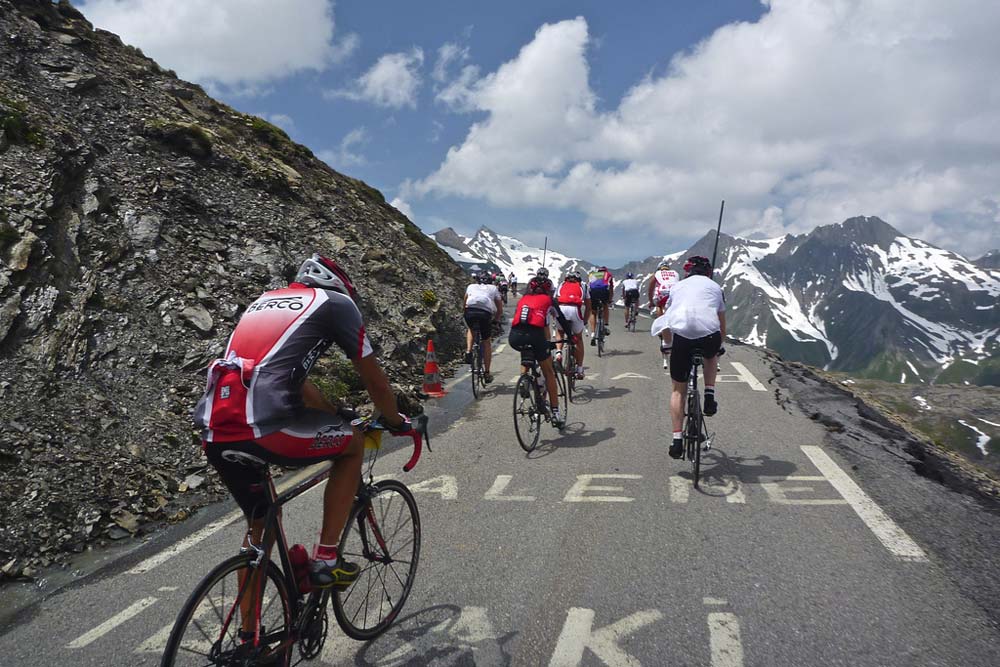Endurance cycling stands as a test of both body and spirit, where riders face more than just the strain of distance. Challenges come in many forms, from harsh weather conditions to steep climbs, testing your mettle in an unpredictable environment. The journey is often marked by the monotony of endless roads, the weariness that seeps into your bones, and the discomfort of digestive issues.
Yet, it’s this very journey against the odds that makes long-distance cycling immensely fulfilling. The harder the struggle, the richer the rewards. Pushing past these hurdles offers not just stories worthy of any gathering but also breathtaking views and a deep-seated self-assurance born from traversing vast expanses under your own power.
To extend your horizons on the bike, it’s crucial to gear up not just physically but mentally as well. The secret to enduring longer rides lies in harnessing the power of your mind. Continue reading for six strategies that will enhance your enjoyment and help you remain on your bike for extended periods.
Accept The Challenge
In the early stages of cycling adventures, the rigor of extended rides was often underestimated.
Was rain anticipated? The thought process was often, “There’s just a 50% chance of rain.”
A complex route that needed navigation? The mindset was, “It will get sorted out as it happens.”
Feeling drained from a demanding week prior to the ride? The conviction held was: “The ride will bring about improvement.”
Yet, it was swiftly realized that hoping for the most favorable outcome seldom matched with reality, and relying on such hope was far from a reliable plan. The failure to thoroughly prepare for potential obstacles only intensified the challenges faced, due to an unprepared state for dealing with them. More daunting than being caught without protective gear in the rain, or endlessly circling in the wilderness due to not investing effort into a detailed route plan, was the deep sense of exasperation experienced with each complication encountered.
Questions like “Why does this always happen?” “Why now?” “Why this issue with the equipment?” became common.
It was eventually acknowledged that a shift in perspective was essential. Rather than depending on a hopeful outcome and then feeling struck down when things veered off course, a decision was made to anticipate and adapt. By welcoming challenges as they presented themselves, a peace of mind was achieved, paving the way to devise effective solutions for the problems at hand. Moving from a mindset of hopeful anticipation to one of proactive analysis, the internal conflict ceased, and there was an increased willingness to address problems at their onset.
When setting out on the next ride, consider the value of accepting trials. It’s important to recognize that difficulties are not signs of defeat but rather opportunities for personal advancement and learning.
Shift Your Mindset
How does one adapt mentally when things veer off the intended path? A strategy that has proven effective for me involves initiating a mental reset. This action is taken the moment it becomes apparent that my current train of thought is detrimental. For example, while cycling, if I catch myself dwelling on feelings of inadequacy due to not maintaining my desired speed, or if I fixate on the discomfort of cycling through endless rain, it’s a signal that it’s time for a mental reset.
Performing a mental reset curtails harmful or exaggeratedly negative thoughts before they spiral out of control. I imagine releasing all the negativity: Self-doubt, harsh self-criticism, and negativity—They’re all left behind, I tell myself. Discarding these counterproductive thoughts as I continue riding, now with a more lucid mindset.
However, this is not always a permanent solution. In challenging situations, it’s common for pessimistic thoughts to re-emerge, even for those with a strong resolve. When this happens, the solution is to mentally reset once more.
And again, if necessary.
Repeat this process as often as needed to maintain focus on the journey ahead, rather than getting lost in circular thinking.
The Tremendous Power of Affirmations and Self-Talk
On solitary rides, you embody both mentor and supporter, guiding yourself through self-discipline towards your cycling benchmarks, be it power or velocity. This role extends to the narrative you craft in your mind.
“Speaking to oneself, audibly?”
Absolutely, and frequently. When solitude is your riding partner, nurturing an uplifting inner monologue is essential. Picture the energizing force of a spin class coach, driving you to break through your self-imposed barriers. Positive affirmations act as anchors, keeping us present and dedicated to our immediate goals, disrupting the loop of thoughts like “This is painful,” “I’m not capable,” or “I wish I were somewhere else.”
You can either craft your own affirmations or seek out resonant phrases online. In my journey through ultra-endurance cycling events over recent years, these affirmations have become my mantra:
- “Keep pushing, victory is close.”
- “Believe in your inner strength.”
- “Embrace the now, it’s all we have.”
- “Heart, spirit, muscles—unite!”
- “Steadfastness brings success.”
On your next ride, tune into your self-dialogue. Is it empowering, or are you your own harshest critic? If you find it’s the latter, experimenting with a more positive script could reveal transformative effects.
Leverage Your Inner Reasoning as Inspiration
Embarking on the Tour of the Alps, a grueling 500-mile bike race winding through the heart of the European mountain range, my aim was to clock in a time regarded as a benchmark of excellence. The most challenging moment hit around the 20-hour mark, as my body cried out from the relentless exertion and the nocturnal chill set in. Pausing to add yet another layer, the thought of taking a longer break, curling up, and slipping into sleep was enticing. However, my goal of achieving a remarkable time kept me anchored to my purpose.
Feeling completely drained yet determined, I climbed back onto my bike. I was conscious that to secure a time celebrated as a standout achievement in the race, prolonged stops were not an option.
Motivation is a personal affair. When the journey becomes daunting—and it undoubtedly will—revisiting the initial spark that drove us to the starting line can be the very push we need to continue.
If you’re yet to define your “Why,” it’s worth delving into before your next significant cycling endeavor. It could be a specific time goal for that event, or a larger, overarching ambition. When doubts start to surface or you find yourself veering off course, remind yourself of your “Why.” If it’s compelling enough, it may just be the force that tips the balance, helping you to persevere through the tough moments.
Rely on Your Preparation and Months of Training
Anticipating the start of the Tour of the Alps or a ride that pushes your boundaries can be nerve-wracking, especially after dedicating months of effort to prepare. Yet, when the moment arrives, it’s easy to become overwhelmed by anxiety, imagining all the things that could go wrong, with your heart racing and palms sweating. The question then becomes, how do you break free from this cycle of worry, regain your focus, and truly enjoy the experience?
This was precisely my experience at the dawn of the Tour of the Alps. I was on the brink of being late to the starting line, having decided on one last-minute visit to the restroom (my third in half an hour) due to overwhelming nervousness. In a haze of anxiety, I set off into the early morning chill, forgetting to turn on my bike lights, my hands turning cold as I realized I had tucked my gloves underneath my phone and charger in my jersey pocket.
How did I manage to recenter myself and get back into the spirit of the race? I drew upon the memory of all the training that had led me to that point. This was not merely about showing up on the day of the race; it was about all those days I had dedicated to training, earning my spot in this prestigious event.
“The hay is in the barn,” as the saying goes.
With this perspective, I redirected my nervous energy towards making more strategic decisions in the moment. And, to my surprise, I started to enjoy the ride.
It’s important to remember that training extends beyond just cycling. It encompasses all aspects of preparation for the event, including engaging in comprehensive stretching and mobility routines, to maintain flexibility and prevent injuries from overuse.

Enjoy Your Ride!!
Some might argue that ultra-cycling is meant to be a serious pursuit, devoid of enjoyment. But I question that notion. Unless you’re competing professionally, cycling isn’t your paycheck—it’s your passion. Why dedicate so much time and effort if the experience brings nothing but discomfort during those pivotal moments?
For me, the choice is clear: enjoyment is non-negotiable.
Moreover, when you’re having fun, your perceived rate of exertion (RPE) tends to drop, even with the same level of physical output. For endurance enthusiasts, this translates to covering greater distances with less perceived fatigue—a definite win!
Admittedly, there are moments when fun seems out of reach. Take, for example, a particularly grueling stretch during the middle of the night at the Tour of the Alps. Every bit of my focus was on maintaining balance and momentum. With numb hands and feet, enjoyment was far from my mind. Yet, as dawn broke and warmth returned to my limbs, I found myself counting my blessings: the strength in my legs, the breathtaking scenery around me, and the unwavering support of my team. Gradually, my spirits lifted, and my pace quickened.
In his book “Ultra Cycling & Bikepacking: All You Need To Know,” Stefan Barth offers a simple yet effective strategy for turning around a tough day: just smile. Looking back, I might have been doing this subconsciously, as evidenced by the broad, cheerful grins captured in numerous event photos. Barth explains that smiling releases chemicals that elevate our mood. Initially, forcing a smile might feel odd and uncomfortable, but the positive impact on your mood is undeniable and well worth the effort.



